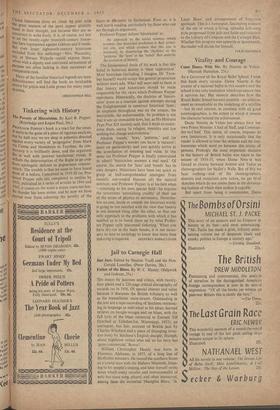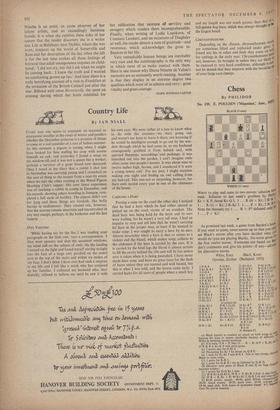Vitality and Courage
Come Dance With Me. By Ninette de Valois. (Hamish Hamilton, 25s.) As a Governor of the Royal Ballet School, I wish this book every success. Dame Ninette is the creator of a national ballet in this country and the school is the only institution which can ensure that it survives her. Her memoir describes hcw the Royal Ballet School became possible—an achieve- ment as remarkable as the launching of a satellite —but its real interest, in common with all good autobiographies, is the extent to which it reveals the character behind the achievement.
Dame Ninette de Valois has always been her own Prime Minister, Chief of Staff, and Comman- dcr-in-Chief. This status, of course, imposes its own limitations. It is only occasionally that the reader is allowed to hear the debates and the con- troversies which went on between this trinity of persons. Probailly the most important decision in the history of British ballet was taken in the season of 1934-35, when Dame Nine to was forced to choose between Ashton and Tudor as choreographers for Sadler's Wells. But of this we hear nothing—and of the choreographers, dancers and musicians now active, we get brief sketches which do not assess them in the devastat- ing fashion of which their author is capable.
But apart from being a commander, Dame
Ninette is an artist, an acute observer of her fellow artists, and an exceedingly feminine female. It is when she exhibits these sides of her nature that the reader discovers she is a writer too. Life at Baltiboys, near Dublin, where she was born, conjures up the world of Somerville and Ross and her description of the day when she left it for the last time evokes all those feelings of betrayal that adult omnipotence imposes on child- hood : 'I did not cry, nor did I ask when we might be coming back : I knew the truth and I wanted no comforting grown-up lies.' And later there is a truly horrifying account of a visit to Frankfurt at the invitation of the British Council just after the war. Billeted with some Herrenvolk, she spent an evening during which her hosts exhibited for her edification that mixture of servility and savagery which renders them incomprehensible. Finally, when writing of Lydia Lopokova, of Constant Lambert, and on occasions of Diaghilev as well, the reader detects a note of gratitude—and reverence, which acknowledges the great in- fluences in her life.
Very remarkable human beings are inevitably very rare and the autobiography is the only way in which most of us make contact with them. Here is one reason why Dame Ninette de Valois's memoirs are so eminently worth reading. Another is that they display in an extreme degree two qualities which most of us admire and envy : great vitality and great courage.
MARK BONHAM CARTER















































 Previous page
Previous page